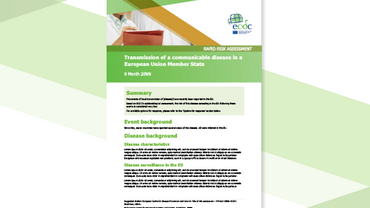Rapid risk assessment: Outbreak of Ebola virus disease in West Africa - 9th update, 30 January 2015
In the second half of January 2015, WHO reported a significant drop in weekly cases – and the end of the spread of the disease – in all three currently affected countries (Guinea, Liberia, Sierra Leone).
Executive Summary
The risks posed to Europe by the Ebola virus disease (EVD) epidemic in West Africa are lower than previously as the number of cases decreases each week.
The risk of EVD being imported into the EU or the risk of transmission occurring within the EU remains low or very low because of the range of risk reduction measures taken by the Member States and the affected countries.
Even if lower, EU/EEA citizens travelling to affected countries, especially healthcare workers, are still at risk of being infected, so the recommended risk reduction measures for EU/EEA citizens remain unchanged.
As of 29 January 2015, 22 136 cases of Ebola virus disease (EVD), including 8 833 deaths, have been reported by the World Health Organization (WHO) in nine reporting countries (Guinea, Liberia, Mali, Nigeria, Senegal, Sierra Leone, Spain, the United Kingdom, and the USA).
Achieving zero cases
The significant drop of EVD cases in West Africa can only continue if control efforts are maintained. The situation in the three most affected countries varies considerably: some areas are experiencing small outbreaks, and the situation is not yet under control. A resurgence of cases and the epidemic remains a possibility. There is also a possibility that the epidemic continues at a low intensity due to incomplete contact tracing and the inadequate management of new infections.
All public health measures should be continued or enhanced in order to mitigate the remaining risk of exposure. Surveillance activities and effective contact tracing should be strengthened in order to achieve zero cases. In this respect, the Ebola outbreak continues to be a Public Health Emergency of International Concern (PHEIC).
Continued vigilance is essential in order to ensure that re-entry standards in Europe do not lapse: returnees with high body temperature need to be tested in order to determine the cause of their fever. It is important to keep in mind that the affected countries are at high risk for malaria, and that the influenza season has started in the EU both of which could cause fever.





